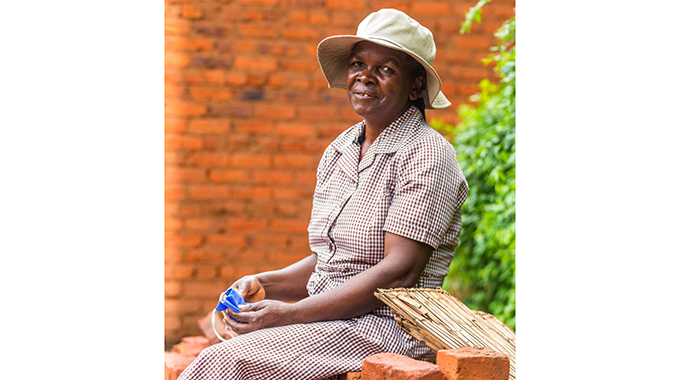Village Health Workers at frontline of COVID-19 response in rural Zimbabwe

From sharing their own resources with the poor to fighting age-old customs and dealing with cross border threats, Village Health Workers (VWHs) in rural Zimbabwe are taking on the new challenges brought by COVID-19 head-on.
We follow three VHW in Zimbabwe’s rural Chipinge District. Mavis Mlambo, Loveness Maphosa and Miranda Muyambo are all dedicated to their roles as Zimbabwe’s frontline of health in rural communities and tackle the unusual situations brought about by the COVID-19 pandemic.
Community level health care and VHWs are supported by UNICEF through the Zimbabwe Idai Recovery Project (ZIRP) funded by the World Bank and the Health Development Fund (HDF), supported by the EU, UK Aid, Sweden, Irish Aid and Gavi.
In Chipinge district, trudging rough terrain through valleys and mountains to reach community members in dire need of health services and education is the least of the concerns of VHWs.
Aiding the elderly
One in every eight households that Mavis Mlambo serves in Chinyika village is headed by elderly people who need care. Mlambo travels long distances to ensure they are all safe. She serves 80 households in total.
“One man can’t even walk, and he struggles to sit properly. Then there the elderly women who takes care of their grandchildren. I can’t ask them to leave their homes, so I take my bag and my medicines and set off for their homes. I have to go because they need the help,” she said, recognizable in her familiar brown and white checkered uniform and wide brimmed brown hat, but tired from the day’s rounds.
The oldest beneficiary is 90 years old and the majority are in their 70s. According to her experience, many of them cannot afford soap, sanitizers or masks. This forces her to share the little she has with them to ensure they are safe. Other times, she asks the village head to help.
Mlambo, who is 53 herself also conducts community sessions for the younger ones with COVID-19 education taking the form of practice and theory. Mask wearing is mandatory at every meeting. People start by washing hands under running water with soap and practice social distancing in the sitting arrangement.
“Then we begin the discussions by talking about COVID-19 before we engage on malaria, TB, pregnancies and other things,” said Mlambo, who advises people to sew their own masks. She teaches that the ones paraded on wooden tables at the local shops for everyone to pick, try on and choose are both expensive and unsafe.
Burying funeral traditions
Loveness Maphosa has taken it upon herself to track the dead bodies arriving in her village of Matanga and surrounding areas in Chipinge district. She does this to enforce COVID-19 guidelines at burials to contain the spread of the virus and save lives.
“At funerals, only the close relatives are the ones that should stay around for the events. Everyone else must pay their condolences and leave. Buckets of water with soap should be strategically placed. Cultural norms such as washing and dressing the body and singing and eating in groups is suspended.
“Often this involves clashing with people determined to practice age-old funeral rites that could lead to the spread of the virus,” said Maphosa, recalling a time when some family elders nearly turned violent on her for “disrespecting the customs”.
“It’s a big challenge because these are things they have done for ages and some think it is taboo to abandon cultural traditions,” Maphosa shares. In such instances, she counts on the support of traditional leaders to insist on suspending the funeral rites.
To learn of the movements of dead bodies arriving in the area and to ensure burials are compliant with COVID-19 regulations, Maphosa is part of a vibrant intelligence gathering network comprising immigration officials, VHWs, health officials, traditional leaders and community members.
“The community members tip us because they are also afraid of coronavirus,” said Maphosa.
Infection prevention at borders
Miranda Muyambo stays only a few kilometers from Zimbabwe’s porous rural border with Mozambique. Children from this neighbouring country make up almost half of the about 600 pupils at nearby Dimire Primary School in Zimbabwe. She says this has been the situation for years due to the “openness” of the remote border and intertwined cross-border family relations.
However, the outbreak of COVID-19 has brought with it new risks of cross-border transmission.
“You see those houses there, they are in Mozambique, the people there get medical help here,” Muyambo said, pointing to buildings near her home in this remote part of the country. “We can’t really say there is a border, so people freely walk in, they don’t even know they have jumped the border. So nowadays I have to constantly be at the school taking their temperatures and enforcing prevention measures. The risk of cross border transmission is very high here,” said Muyambo.
As the sun disappeared into the horizon, Miranda helps in preparing supper for her family, anticipating another day of various visits around a community that looks up to her.
“Someone has to do it,” Miranda says warmly. “The community depends on it and together we can be safe and healthier.”- Reproduced from Unicef Zimbabwe









Comments